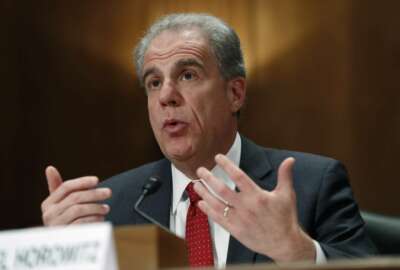Hubbard Radio Washington DC, LLC. All rights reserved. This website is not intended for users located within the European Economic Area.
The Drug Enforcement Administration fails its own lie detector policy
Dozens of Drug Enforcement Administration agents are on the job without having taken a mandatory polygraph examination or, in some cases, they failed the test....
Dozens of Drug Enforcement Administration agents are on the job without having taken a mandatory polygraph examination or, in some cases, they failed the test. This, according to a look-see by the Justice Department’s Office of Inspector General. For more, and what’s happened since this discovery, Federal Drive with Tom Temin spoke with Inspector General Michael Horowitz.
Interview Transcript:
Tom Temin And you have issued a memorandum of concern. That’s a kind of urgency document, correct?
Michael Horowitz That’s right. This is something that we issue when we’re to have an ongoing audit. But we think there’s something very important that we need to get to the attorney general, to the Congress, to the public, to let them know of a particularly serious problem we found.
Tom Temin What tipped you off to this? Was a type of whistleblower complaint or.
Michael Horowitz So we got a complaint from a concerned individual who came forward and said, you should be looking at these policies. Nothing specific to what we ultimately found, but general concern and pointing us in the right direction.
Tom Temin And the policy changed dramatically in 2019 for the DEA concerning the use of polygraphs, what happened to them?
Michael Horowitz So in 2019, the DEA’s acting administrator, announced a policy that all special agents, intelligence research specialists, diversion investigators and forensic chemists had to take polygraphs and pass them, which the FBI had already done. Other members of the intelligence community routinely do, but DEA hadn’t been doing.
Tom Temin And that’s kind of ironic. I thought that polygraph science was sort of discredited, but I guess not.
Michael Horowitz No, it’s not discredited. In fact, it’s used frequently for job applicants, for renewals of top security and other clearances. And also, for example, when we do administrative investigations, the FBI and the inspector general’s office use them on occasion in certain circumstances to assess an individual’s credibility.
Tom Temin So, in other words, DEA was late to the game and making them mandatory for employment in these areas.
Michael Horowitz Yes, DEA should have done that earlier. In 2019, the acting administrator implemented the policy.
Tom Temin And just as the policy, just a detail questioned diversion that has to do with the legal drugs. The DEA also administers oversight of.
Michael Horowitz Right. Those are the regulatory side of DEA idea has obviously the criminal side that the public probably is generally aware of, which the special agents, law enforcement. These are the folks who check on pharmacies, doctors, etc., to make sure that prescribing and the chemicals that are used in the drugs are handled appropriately.
Tom Temin All right. So you looked at the policy and then something led you to look at, are they following the policy? Tell us what happened there and what you found.
Michael Horowitz So we started reviewing the records as part of our audit and had this tipped off information from a concerned individual. And we found that, in fact, while the acting administrator had announced the policy in 2019, DEA actually hadn’t implemented it effectively because what they were doing is rather than using it on applicants going forward, they decided to look backward and see what existing job announcements were prior to 2019 that were still open and to hire off of those. And they some people took the position at the DEA that if you as long as you hired off a job announcement before 2019 that was still open, you didn’t have to comply with the acting administrators position.
Tom Temin That sounds like a very narrow type of almost an excuse. That’s a little bit of an acrobatic movement to get around what seemed like a pretty clear announcement from the acting administrator.
Tom Temin And you also found that quite a number of people were, in fact, hired without having had the test administered.
Michael Horowitz That’s correct. We found 77 employees had been hired who hadn’t passed the exams, in fact, had shown deception. And we found three who hadn’t taken the complete set of exams, both the national security side and the suitability side.
Tom Temin Right. If you haven’t a reaction that shows you’re not being truthful on the test, then you are automatically disqualified for three years, right, from DEA. And so what happens at that point is they stopped the exam and they asked the individual why they indicated. Sometimes it’s deception, sometimes it’s tactics used to evade or it’s believed that is occurring. And so you stopped the poly at that point and you ask the individual what’s going on and you might resume it if it’s a temporary issue. But if it’s determined that you have, in fact, used countermeasures to try and deceive or you’ve, in fact, clearly failed, you’re right, then you are out. You should have been disqualified from being hired at that point.
Tom Temin What’s a countermeasure in a lie detector test? Like taking a tranquilizer so you won’t get a bodily reaction to a question, Right. Or or trying not to breathe normally or act normally to try and control the circumstances around the the polygraph.
Tom Temin No card counting, in other words.
Michael Horowitz Correct?
Tom Temin Well, so these are people that had had the test, might have failed, but were hired anyway. The DEA said by virtue of having started their application under the pre imposition of the policy.
Michael Horowitz Correct. In fact, some did fail. We’re speaking with Michael Horowitz. He is inspector general of the Justice Department. Golly. I mean, how high up the chain did the knowledge of this go? I guess the question is, the administrator at the time of the hires, I presume, would have said, no, you can’t do that because here is the policy.
Michael Horowitz Yeah. And we have no reason to believe that the acting administrator was aware of it. The purpose of issuing this, though, was to get the policy corrected right away.
Tom Temin And these people that are on the payroll now working in forensic chemistry, diversion, intelligence or a special agents, do they have to be dismissed or what happens to them?
Michael Horowitz Well, that’s one of the key questions. It’s unclear whether they can be dismissed at this point. So one of the recommendations we made to DEA was that they look to mitigate the harm that could come from these employees being on the payroll. For example, there we identify in here individuals who failed the national security portion of the exam, who failed the drug use portion of the exam. And so there clearly needs to be some steps taken to mitigate the harm that individuals who are on the payroll but perhaps can’t be dismissed now under federal law are put in proper position so that any potential risks they pose are, in fact mitigated.
Tom Temin I imagine there’s a risk management approach they could take to this. For example, you said there’s a national security part of the exam and if someone could be suspect of having ties to the cartel, that’s one thing. On the drug use thing. Well, yes, I had some pot six months ago. That’s another thing.
Michael Horowitz Right. Right. These are wide ranging issues. Some of them, for example, also failed on questions about whether they were truthful in their applications. And so there, for example, you would want it to mitigate it, try to understand what they might have been untruthful about. If it’s I got my city wrong of where I was born. Maybe not so significant. Obviously, if it’s prior criminal activity, that’s a big problem.
Tom Temin Right. Sure. Yes. I distributed cocaine and loved it for ten years, but I’ve given it up now and so it probably still wouldn’t want to work for the DEA, nor would they want you. Well, two questions. First, have they corrected the situation for current and future hires?
Michael Horowitz Yes. As you might guess, when the first recommendation we made is implement the policy that was announced in 2019 completely, Don’t leave any loopholes or exceptions. As we were writing this up, DEA told us they were doing that already, so that was obviously good news. They also told us with regard to DEA task force officers, where DEA has a rule that if a task force officer, in other words, a state or local law enforcement officer who joins a DEA comprised task force with which there are many, the DEA has a policy that if those individuals fail polygraph, they’re not allowed to be on the task force, period. They’re obviously not DEA employees. That’s not something that the DEA has to live with. They can deal with it. We made a recommendation that they implement that as well, and they told us they were doing that, too.
Tom Temin Yeah. So they generally were probably horrified by the findings themselves and have been moving to correct it. And just out of curiosity, how long does the test take? What kinds of questions do they ask?
Michael Horowitz There are the two parts to the polygraph questions. There’s the now security side, which, as you might guess, is focused on contacts with foreign individuals, how you’ve handled classified materials previously, your connections to foreign terrorist groups or relatives who might be connected to it, things like that. The suitability polygraph is all about prior drug use, criminal activity, association with gangs, things like that, that would trigger concerns about people being involved in criminal cases, for example.
Tom Temin And just out of curiosity, does the security clearance process ever coincide with the this particular polygraph process?
Michael Horowitz It should. In fact, what we found in in some instances is that DEA hadn’t adequately documented what had occurred. And so when some of these applications made their way to the hiring panels, the hiring panels wouldn’t have known that this issue existed. And that’s the concern, is that the security division, those who deal with security clearances, hiring panels, all of those folks understand accurately what has occurred in the hiring process.
Tom Temin Yeah because in the national security clearance process, I don’t think there’s a polygraph test as part of that, just a 100 page form.
Michael Horowitz There is. But but the intelligence many regularly does use polygraphs for applicants and re-upping your security clearance.
Tom Temin Yes. So the potential situation for at least some people is they could have clearance and yet have failed a polygraph test at the DEA. That’s exactly right. In fact, we did find examples of that as we, you know, highlight in this report that certain individuals did not pass their national security clearance polygraph. And presumably since employees at the DEA generally need security clearances to do their jobs, those individuals. There may be individuals working in,.
Tom Temin Wow.
Michael Horowitz …while classified positions that are, that failed the security clearance.
Tom Temin So they were doing a little bit of polygraph shopping until they can find or find a way in.
Michael Horowitz So that that’s precisely the problem. You can’t have that occur in a situation where the intelligence community expects individuals to have passed the polygraph.
Copyright © 2024 Federal News Network. All rights reserved. This website is not intended for users located within the European Economic Area.
Tom Temin
Tom Temin is host of the Federal Drive and has been providing insight on federal technology and management issues for more than 30 years.
Follow @tteminWFED
Related Stories
Related Stories
-
Inspector General detects big polygraph failure at DEA Federal Newscast
-
Department of Justice Inspector General Michael E. Horowitz Search for Accountability





